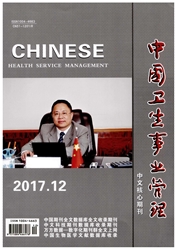

 中文摘要:
中文摘要:
亲社会违规行为是员工为帮助组织或者组织的利益相关者有意识地违背正式的组织政策、规定或禁令的行为。文章研究了影响医护人员亲社会违规行为的人格特质和情境因素及其交互作用。对三家中小医院101位医护人员的调查数据分析发现,工作自主性和同事行为对亲社会违规行为有正向影响,而自我监控对亲社会违规行为有负向影响。利他人格和同事行为的交互作用对效率导向的亲社会违规行为有正向影响;自我监控和工作自主性的交互作用对亲社会违规行为的三个维度都有负向影响。
 英文摘要:
英文摘要:
Prosocial rule breaking is defined as any instance where an employee intentionally violates a formal organizational policy,regulation,or prohibition with the primary intention of promoting the welfare of the organization or one of its stakeholders.This study examines the effects of two personality characteristics( altruism and self-regulation),two context factors( job autonomy and peers' behavior),and their interaction on doctors and nurses' prosocial rule breaking. Analysis of survey data reported by 101 doctors and nurses from three hospitals leads to the following findings. Job autonomy and peers' behavior have a positive effect while self-regulation has a negative effect on prosocial rule breaking. The interaction of altruism and peers' behavior affect efficiency-oriented prosocial rule breaking positively,while the interaction of self-regulation and job autonomy influence all three dimensions of prosocial rule breaking negatively.
 同期刊论文项目
同期刊论文项目
 同项目期刊论文
同项目期刊论文
 期刊信息
期刊信息
